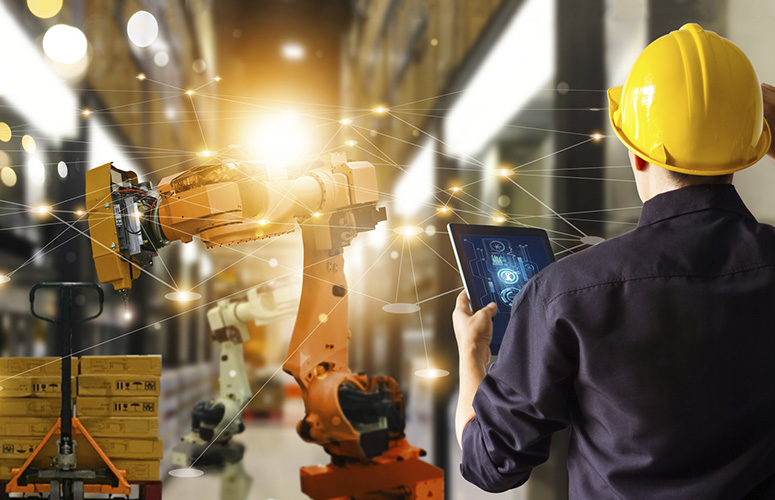A study conducted by the <a href="https://ekoizpen-zientifikoa.ehu.eus/grupos/24640/detalle" target="_blank">Technological Intelligence for Sustainable Economic Development of Business in Society</a> research group of the University of the Basque Country (UPV/EHU) shows that integrating Industry 4.0 technologies makes a positive contribution towards some aspects of occupational health and safety for workers, and looks in particular at the new risks arising from the introduction of these technologies.
Industry 4.0 technologies promote workforce occupational health and safety
A study by the UPV/EHU analyses the new risks arising as a result of the technological implementation of Industry 4.0
- Research
First publication date: 22/06/2023

The benefits offered by Industry 4.0 technologies are wide-ranging and varied: they reduce processing times, the resources and tools needed, improve operations management, increase productivity, etc. To analyse how all this affects the occupational health and safety of people, the UPV/EHU research group designed a survey to which 130 managers and/or technicians of companies that are trailblazers in the development of Industry 4.0 technologies responded. “We then selected technology integration projects representing 8 technology groups (Additive Manufacturing, Artificial Intelligence, Artificial Vision, Big Data and/or Advanced Analytics, Cybersecurity, Internet of Things, Robotics and Virtual and Augmented Reality) to analyse them in depth. To do this, after conducting 37 interviews, we analysed other sources of information, such as project reports and technical reports,” explained Iker Laskurain-Iturbe, a member of the research group and one of the authors of the study.
According to the research, “in general, the Industry 4.0 technologies analysed exert a positive influence on the health and safety of workers in any company”. However, “there are also new emerging issues or risks, mainly psychosocial ones, that companies need to take into account in order to maintain the confidence and health of their employees. The influences on new emerging risks have been detected in all technologies except the Internet of Things”, as Germán Arana-Landín and Mikel Iturrate highlighted.
“Artificial Intelligence,” for example, “allows cameras to carry out proactive surveillance in offices in such a way that they can help to improve the ergonomics of the workforce, since the camera is capturing information in situ, picking up the movements of employees at all times; data can be extracted from it to provide recommendations for correction purposes”, said Beñat Landeta-Manzano. However, “the staff may feel they are being watched and even find this action stressful”, added the UPV/EHU researcher.
Something similar is happening with the arrival of robots in the workplace. Robots can take over dangerous jobs and relieve employees from repetitive, stressful, heavy tasks on an assembly line. Robotics will create many new jobs, so people who lose their jobs will have to acquire new skills and face uncertainty, which can lead to stress and anxiety.
The researchers recognise the limitations of this work in terms of the low number of companies analysed, or the need to gather the opinions of all the players involved in the dissemination of Industry 4.0 technologies across the various industrial subsectors. So future lines of research will need to address these limitations: for example, the influence of each technology will need to be analysed using a larger sample; it would also be interesting to conduct this research in various industrial sectors and to get the perspective of each stakeholder: workers, managers, suppliers, etc.
Nevertheless, the authors agree that “Industry 4.0 technologies offer many more opportunities and help companies to become more efficient and competitive. In terms of implementation, key factors in occupational health and safety management are advance communication and training, as they reduce the new risks generated. It is a way of involving the staff of any company in the process for change”.
Additional information
This research was conducted by Germán Arana-Landín, Iker Laskurain-Iturbe, Mikel Iturrate and Beñat Landeta-Manzano. Most of them are part of the IT1691-22 Technological Intelligence for Sustainable Economic Development of Business in Society research group of the UPV/EHU funded by the Basque Government, and participate in the Zirbotics project funded by the Euskampus foundation within the Missions I programme.
Bibliographic reference
- Assessing the influence of Industry 4.0 technologies on occupational health and safety
- Heliyon
- DOI: 10.1016/j.heliyon.2023.e13720



